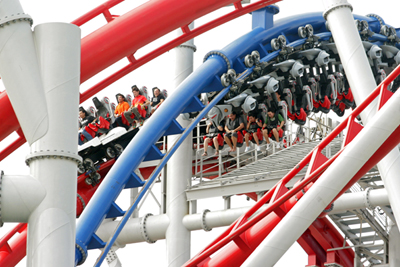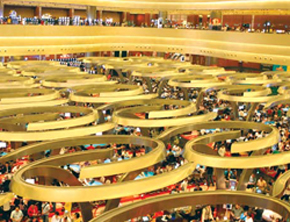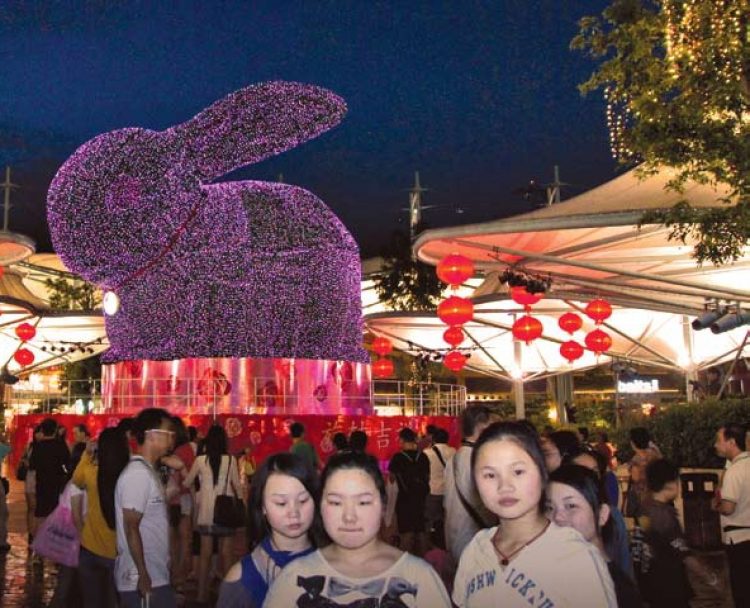The casino at Resorts World Sentosa will likely retain the lion’s share of the Singapore casino market in the Year of the Rabbit—though allegations of unlicensed junket activity in the city-state have led to concerns about the industry’s prospects
The Singapore government’s primary proclaimed objective in legalizing casinos was to boost the Lion City’s tourism numbers. The two casinos opened last year around sprawling Integrated Resorts (IRs) certainly appear to have delivered on that goal.
Singapore’s tourist arrivals rose 20% year-on-year in 2010 to a record 11.6 million, reversing declines of 4% and 2%, respectively, in 2009 and 2008. The 1.13 million tourist arrivals in December set a new all-time monthly record. Notably, Singapore’s tourism figures do not include arrivals via its land border with Malaysia, which likely grew by much more.
 |
The Battlestar Galactica dueling rollercoaster ride at Universal Studios Singapore was shut down after a seat detached and flew off the ride train during routine tests only a week after the attraction’s opening on 18th March, 2010. The issue has now been resolved and the theme park has completed several months of safety tests and received approval from Singapore authorities to reopen the ride on 21st February. The 140-foot tall Battlestar Galactica features two coasters named Human and Cyclon. It is the tallest duelling rollercoaster in the world. |
The first of the two casinos to open was at Genting Group’s Resorts World Sentosa (RWS), on the first day of Chinese New Year last year (which fell on 14th February). The casino at RWS actually opened a few days after the US$4.7 billion property was officially unveiled on 20th January with four hotels and 10 restaurants (with the casino having to wait a few weeks longer to be licensed).
In the 12 months since it opened on 20th January 2010, RWS has welcomed 15 million visitors. Its 1,350 hotel rooms have achieved an occupancy rate of 70%. The hotels at RWS include Hotel Michael, Hard Rock Hotel Singapore, Festive Hotel, and the byinvitation- only Crockfords Tower. This year, two more hotels—Equarius Hotel and Spa Villas—will add another 500 rooms when they are launched as part of the resort’s second phase, which will include a maritime museum, the world’s largest oceanarium and a destination spa.
RWS’s key non-casino draw, Universal Studios Singapore, opened on 18th March 2010, and by the end of the year, the theme park’s visitor count passed the two million mark, even though its key attraction, the Battlestar Galactica duelling twin rollercoaster ride, had been taken offline shortly after the park’s opening until now. Universal Studios Singapore has just announced the ride will reopen on the 21st of this month, when the theme park could well experience a further spike in visitor numbers.
Universal Studios is set to open at ast two more rides this year, including the much-awaited Transformers attraction, while star chef Joel Robuchon, who holds 26 Michelin stars (the most in the world), plans to open three new restaurants at the resort.
Reflecting the quality of the new tourist arrivals drawn by the IRs, the city state’s tourism revenue surged 49% year-on year (outpacing the 20% growth in tourist numbers) to an estimated S$18.8 billion (US$14.8 billion) in 2010. “We’re on target to reach S$30 billion in revenue and 17 million visitors by 2015,” says Singapore Tourism Board Chief Executive Aw Kah Peng. Another contribution RWS has made to the local economy is the creation of 12,000 direct jobs, with plans for further hires. The other IR, Las Vegas Sands Corp’s US$5.5 billion Marina Bay Sands, which commenced operations on 27th April last year, employs 8,000 workers.
 |
Machines in the mix1One of the major mistakes Las Vegas Sands Corp (LVS) made when setting up the Marina Bay Sands (MBS) casino was to replicate the games mix at its Macau properties. Unlike Macau, where baccarat is preeminent, in Malaysia and Singapore, roulette reigns supreme, and the MBS main floor had initially devoted too much precious floor space to the former game and too little to the latter. Since the casino areas at the Inegrated Resorts (IRs) are limited to a maximum 5% of the properties’ total floor space, determining the optimal mix of games on the floor is particularly important. Upon realising it had not provided sufficient roulette tables, though, LVS swiftly rectified the shortfall by installing expansive additional roulette capacity via automated and semiautomated multi-terminal installations. The casinos at both MBS and Resorts World Sentosa (RWS) feature a high proportion of multi-terminals—namely, electronic versions of popular table games—in their gaming machine mix. These multi-terminals generally offer higher yields than slot machines, driving up the average win per machine per day at the two IRs. Whereas gaming machines accounted for less than 5% of total casino revenue in Macau last year, they accounted for almost 20% of casino revenue at MBS in the third quarter of 2010 (the first full quarter of the property’s operation), and probably a similarly high proportion of total casino revenue at RWS—which does not provide detailed breakdowns of its gaming and non-gaming revenue. The Singapore IRs have some of the highest earning gaming machines in the world. The 1,798 gaming machines at MBS recorded an average daily win per unit of US$481 in the third quarter of 2010, versus the US$286 earned by the machines at Venetian Macao. The machines at RWS are widely acknowledged to outperform those at MBS, despite the lack of official figures. During IAG’s visit last month to Singapore, we noticed the RWS slot machines were generally of higher denomination than those at MBS and were enjoying equal or greater player occupancy. |
RWS maintains its gaming lead
Although we’re still waiting for the yearend earnings results from the two IRs, our sources suggest RWS is still comfortably holding onto the larger share of the local casino market, which Aaron Fischer, head of consumer and gaming research for CLSA Asia Pacific Markets, forecasts will reach US$6.5 billion this year and US$8 billion in 2012.
Most analysts had originally predicted the swankier MBS would quickly snatch the market share lead from RWS, despite the latter’s two and a half month head start. It didn’t take long for the consensus view to switch, however, and the smart money is now on RWS holding onto the lead for some time to come.
In a report on Genting Singapore—the Singapore-listed unit that holds Genting’s interest in RWS—published by Goldman Sachs in June 2011, the investment bank commented: “While we think Marina Bay Sands is undoubtedly a far more spectacular property, we believe the US operator has shown itself to be a relatively underwhelming competitor so far.”
Genting gained considerable competitive insights and advantages from operating a monopoly casino property in Malaysia since 1970, including an intimate familiarity with the wants and needs of players from Malaysia and Singapore and an extensive base of customers—many of whom belong to its loyalty card programme—in the region. There is also the matter of the casinos’ interiors, which were also influenced by the respective operators’ familiarly with local players’ preferences. As Goldman put it: “we think Genting may have a more appealing casino product to Asian gamblers.”
The cosy RWS casino allows gamblers to feel a much greater sense of anonymity than the MBS main-floor, which takes the popular stadium-style layout of Sands Macao to dizzying new heights. It will “take longer” for gamblers to “embrace the different casino experience” at MBS, according to Goldman Sachs.
Junket allegations
The dark cloud on the horizon for Singapore’s gaming industry in the Year of the Rabbit is the recent claim of unlicensed junket activity at MBS, revealed in court documents filed last month by a high roller being sued by MBS over a S$250,000 gambling debt.
According to a report in Singapore’s Business Times, Lester Ong Boon Lin alleged in an affidavit that he had owed money to junkets he assumed were operating legally at MBS at the time he accepted the casino’s credit line. Mr Ong claimed the way the alleged junkets operated at MBS was similar to legal junkets he had seen operating in overseas casinos. To date, no junkets have been officially gaming industry consultant, has been enlisted by the Singapore government to conduct background checks on all junket operators applying for licenses to operate in the city-state.
A source quoted by Singapore’s Business Times revealed: “Spectrum has a staff of highly experienced executives who have relationships with law enforcement in other countries. This comes in handy when you’re trying to get background checks done on junket operators from countries or remote areas where it’s not easy to get answers about their financial capability, business background, tax history, or whether they have ties with organised crime. In some instances, it’s quite dangerous to do such checks.”
Spectrum’s thorough background checks command sizeable fees, which have to be shouldered by the junket applicants and are non-refundable, even if their applications are rejected, which is why many junkets are believed to be waiting for clearer guidelines from the Singapore authorities before investing in the process.
There is, though, the possibility of a potential upward revision in Singapore’s gaming revenue forecasts if some junkets do manage to pass the probity checks and secure licences to operate in the Lion City this year, points out CLSA’s Aaron Fischer. Singapore’s gaming market managed to thwart all expectations on the upside in the Year of the Tiger. If the past is any guide, don’t be surprised by a repeat performance this year.
































